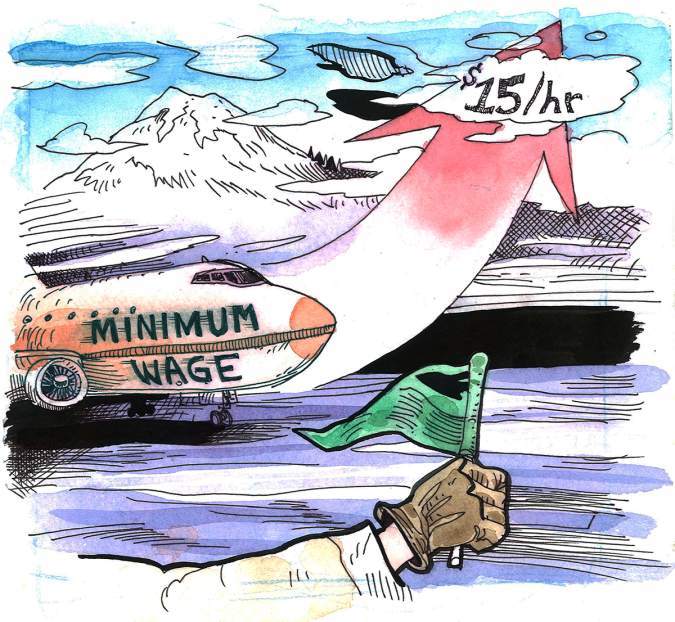Another day, another lawsuit for employers at Sea-Tac Airport.
Two more law firms filed five new lawsuits last Friday against employers for failing to pay their workers a $15 minimum wage, among other benefits. These suits, filed on behalf of hourly workers against the food chains Wendy’s, McDonald’s, Qdoba, Pallino, and Filo Foods (which owns The Great American Bagel Bakery), are the latest in a flood of class action lawsuits brought by some half a dozen firms representing several thousand workers — all demanding that employers retroactively comply with the city of SeaTac’s minimum wage law, passed in late 2013.
“These lawsuits are about enforcing the law; it’s pure and simple in that way,” says Jamal Whitehead, an attorney for Schroeter Goldmark & Bender, one of the firms representing food-service workers.
Yet enforcing the law has been anything but simple. When SeaTac voters passed Proposition 1 in 2013, it was the first $15 minimum wage law in the nation. It included not only the wage stipulation, but other benefits, such as paid sick leave and the requirement that employers give part-time workers more hours before hiring new workers (an effort to prevent employers from unethically keeping their employees just below a full-time benefits threshold).
But several of the large employers at Sea-Tac — including Filo Foods — immediately challenged the law, arguing that it should apply only to SeaTac city workers, not airport workers. In August 2015, they lost. The Washington Supreme Court held 5-4 that the law does indeed apply to airport workers, and labor-law firms have been filing suits to secure backwages ever since.
That’s in part because, while some employers immediately began paying the $15 wage following the 2015 ruling, they argue that they weren’t aware that they’d have to pay retroactively, too. While the law was originally supposed to take effect in January 2014, it was caught up in litigation for nearly two years. “That’s certainly the posture that employers were taking before the Supreme Court ruling,” says Whitehead. “That’s why some of these employers got themselves into a backpay position. They were waiting for a court ruling invalidating the law — and that didn’t happen.”
Of the several dozen suits filed to date, some have already settled, to the tune of some $12 million. The biggest payout from a single company so far, according to the Associated Press, is from Menzies Aviation, the multinational corporation that provides baggage services for Alaska Airlines: It recently settled for $8.2 million with 738 past and present workers.
“The basic deal is, you go to work, you work hard, and your employer is supposed to pay you what you’re owed under the law,” says Whitehead, whose firm’s five lawsuits are the among first brought on behalf of food-service workers at the airport (most, so far, have involved transportation and cargo-related jobs). And it’s not just about backwages — he’s intent on securing payouts for unused sick days, too, and for the extra hours part-time workers should have been getting over the past few years.
That money “really makes a difference” to this particular group of workers, he adds. “These are hard jobs that people are working. For the employers not to pay them what they’re owed is really hurting folks. The only way these laws are going to be real… is if they’re enforced. That’s why these lawsuits are so important.”








